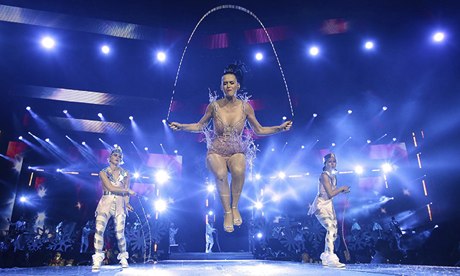
Katy Perry performs at Capital FM's Jingle Bell Ball at the O2 Arena Photograph: Yui Mok/PA Wire
As an artist, getting your song on the radio is a tough issue. Record labels pay pluggers to promote their releases to radio stations – though that's no guarantee of airplay.
What is even more troubling for some artists is the feeling that they won't even be considered for playlisting if they don't perform at radio events, often for free.
The "freebie" events that perhaps cause the most grumbling among the artists and labels I speak to are the ones where the radio stations sell tickets to the show, while the artists are not only required to pay their own production costs, but also to play for free.
Earlier this month the UK's and US's top pop stars descended on London's O2 for Capital FM's Jingle Bell Ball. Katy Perry, Lady Gaga, Tinie Tempah, Disclosure, Olly Murs, Ellie Goulding, James Arthur, Lady Gaga, Dizzee Rascal, Jessie J and Jason Derulo – to name a few – all played a few songs each over the two days.
Tickets were priced from £55.99 to £315, although a portion of ticket sales profit was donated to Capital FM's flagship charity Help a Capital Child.
Every label I've spoken to has claimed its artists do not get paid for appearing at these Capital FM events (there's also a yearly Summertime Ball), and that they have to pay for artist-related production costs (this also usually the case for awards shows).
None of them wanted to speak on the record for fear of being banned from the station's playlist, perhaps noting what happened to One Direction when they made the fatal mistake of thanking BBC Radio 1's listeners for their best British single Brit award – when it was actually voted for by Capital FM listeners.
Artists' production costs can be quite significant – and so can the travel costs. Some artists claim that they were required to fly to London for one of Capital FM's concerts, even though they were in the middle of a tour on the other side of the world, for fear of being taken off the playlist if they didn't.
When contacted regarding this issue, Global Radio (the owner of Capital FM) responded: "Global Radio doesn't comment on contractual issues."
A similar situation applies when it comes to the iTunes festival. All the artists performing pay their own production costs – or, more accurately, their labels do. Depending on the act, these costs can range from about £10,000 to as much as £1.5m (the cost of Lady Gaga's recent show, according to a label insider).
Apple also declined to comment on behalf of iTunes.
The usual excuse for artists having to, effectively, pay to play is that it is a promotional platform. The promotional argument for not paying now covers pretty much every aspect of a musician's possible income streams. Artists that voice their dismay over their records being pirated are told by technology "experts" that they should view piracy as promotion for their live shows. Even synchs (when music is used in a film, TV show or computer games) are now proclaimed to be promotional, and so shouldn't have to be paid for, a request that recently rebuffed by electronic artist Whitey, who wrote this cutting letter to a TV company.
Of course it could be argued that the artists promote the radio stations as much as the stations promote them. Being able to say that huge artists are playing just for them is great promotion. In the case of iTunes (which until this year, at least, was not a radio station) the promotional value for the artists is being on the front page of the iTunes store in the runup to, and during, the festival – for iTunes it's fantastic branding (iTunes also has 35 worldwide radio partners for the festival, including Global Radio).
In the US, artists are regularly required to do personal appearances for free at clubs where the radio stations' DJs are playing, in return for the station playing their records.
The effect of not getting airplay is even worse in the US, where it counts towards artists' chart position – unlike the UK.
While major labels may grumble behind closed doors about having to pay tens of thousands of dollars – or, in the case of megastars such as Lady Gaga, Justin Timberlake and Rihanna, a lot more – to perform for free while radio stations are raking in money from ticket sales, this practice completely shuts out smaller labels that simply can't afford the expense.
Simon Raymonde, owner of independent label Bella Union, has said that the £20,000 it cost him to bring Fleet Foxes over to Europe for a number of gigs (before they had become successful) could have put it out of business if the shows had not succeeded. Other independent labels I've spoken to said they simply couldn't afford to send an artist all the way to Los Angeles to play a radio DJ club gig for free – and as a result they received no airplay.
If you wonder why labels feel forced to pay for their artists to perform at radio events, ponder how many acts in the top 40 singles chart have had no airplay. It's a pretty short list.
No comments:
Post a Comment